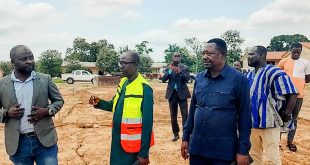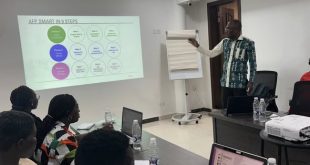As nations worldwide continue to embrace the concept of waste as a resource to cherish and not to discard, Ghana is also coming up with initiatives that will not only improve the sanitation situation, but also contribute to sustainable industrial development.
One such initiative is the Hybrid Waste to Energy as a Solution for Ghana Project. The objective is to develop tailor-made solutions to tackle the problem of waste and power management in Ghana by converting waste into useful energy.
The driving force behind the project is the country’s quest to find a long-term solution to the menace of solid waste by treating waste and generating power from the treated waste.
Such a measure has become critical as currently, Ghanaians are producing 14,000 tonnes of waste every day. Of this, a staggering more than two-thirds is not collected, treated or safely disposed of, but indiscriminately dumped in open drains, or openly burnt or ends up in open dumpsites.
One will not be far from right, in saying waste has become one of the commonest features in Ghana. Refuse dumps are the first sites one encounters when approaching or leaving most towns and communities. And as population rises and urbanization increases, waste generation is expected to increase as well, particularly in urban areas.
Therefore, the Hybrid Waste to Energy as a Solution for Ghana Project is initially targeting Ghana’s metropolitan areas, where waste to energy can be best integrated into waste management plans and programmes.
The project is a collaboration between the German Government, who is funding the project to a tune of 5.8 million Euros, and the Government of Ghana.
The Ministry of Environment Science Technology and Innovation (MESTI) is facilitating the project implementation, which is being rolled out by a consortium of German and Ghana research institutions.
The University of Rostock Berlin, Germany is leading the process in collaboration with the German Federal Ministry of Education and Research, German Biomass Research Centre and Gircon in Germany.
The Ghana-based partners are the West African Science Service Centre on Climate Change and Adopted Land Use (WASCAL), Council for Scientific and Industrial Research (CSIR), University of Energy and Natural Resources (UENR), Kumasi Technical University and the Centre for Energy, Environment and Sustainable Development (CEESD).
Together, the project team is bringing into Ghana a combination of research and technologies to support and enhance the management of municipal solid waste.
The novel 400Kw power hybrid waste to energy treatment facility that combines solar PV, biogas and pyrolysis technologies to treat municipal solid waste and also generate power is being constructed at Gyankobaah in the Atwima Nwabiagya Municipality in Ashanti region.
The project will contribute to the inclusion of renewable energy in Ghana’s electricity generation mix and the country’s climate change mitigation strategy.
Details of the project were disclosed at an Expert Group Meeting organized by the Science Technology Policy Research Institute of the CSIR (CSIR-STEPRI) in Accra, on Monday 14th December, 2020.
The purpose was to discuss highlights of a review of various policy documents relating to Waste, Energy and Waste to Energy in Ghana; and solicit expert views on key activities of CSIR-STEPRI under the project.
The Deputy Director of STEPRI, Dr. Mrs. Adelaide Agyeman, who chaired the meeting, emphasized the important role of proper solid waste management in the attainment of the SDGs.
“With a global commitment of ensuring sustainable management of our environment and providing clean and modern sources of energy, the need to reduce the volume of municipal solid waste and transform greenhouse gas emissions to energy sources such as synthetic gas, bio-oil, steam and heat-producing energy has become more urgent now, than ever,” she stated.
She looked forward to policy recommendations and interventions to accelerate integration and promotion of sustainable waste to energy initiatives in Ghana as well as support the implementation of the Hybrid Waste to Energy as a Solution for Ghana Project.
Presenting an overview of the project, a Senior Research Scientist of CSIR-STEPRI, Roland Asare said the project is being implemented in five work packages, some are already on-going.
Roland explained that package 1 is focused on data collection involving various levels of stakeholder engagements and resource mapping, characterization of waste feedstock and setting up of a laboratory; while package 2 looks at designing of the 400 kW solar PV, biogas and pyrolysis plant, its construction and testing, monitoring and capacity building.
Package 3 comprises creating the business model based on the outcome of technical and economic feasibility studies to serve as basis to build 10 similar facilities in other parts of the country; package 4 is devoted to sustainability and environmental studies, and package 5 involves policy gap analysis and development of policy guidelines.
Participants at the meeting included energy experts, policymakers, technocrats, researchers, scientists, representatives of the private sector, civil society members and advocates on water, hygiene and sanitation.
They welcomed the project, but among other things, expressed concern about whether the technology being devised will be appropriate for the Ghanaian setup.
In response, WASCAL’s Project Officer for the Renewable Energy Project, Alberta Aryee said the project has taken that issue into consideration and does not allow whole sale technology transfer.
“Rather, it involves training of high-level local experts in waste management and treatment technologies, and building the capacity of local experts to design, construct and maintain the plant,” she explained.
Alberta further explained in an interview that the project has onboard a local partner to assist in the training and technology design for the Ghana setup. She added that “the four-year project, will initially benefit Kumasi and its environs encompassing the 22 Metropolitan, Municipal and District Assemblies within 30 km radius of the plant and whose solid waste feed into it.”
A member of the Project Team, Johnny Owusu-Arthur delivered a presentation on the policy gaps and insights on waste to energy in Ghana.
He highlighted several inherent issues such as low level of knowledge, research and development on waste-to-energy technologies to appropriately inform relevant policies.
Others include inadequate regulatory and institutional frameworks to support waste-to-energy projects and initiatives; poor governance for waste management; and limited financing for sustaining knowledge, projects and investments.
For the way forward, Johnny proposed that government should dedicate funding for research and development on waste and renewable energy technologies.
Additionally, incentives and support schemes should be provided for waste segregation at source to boost private sector investment.
Source: Ama Kudom-Agyemang, Contributor
 Home Of Ghana News Ghana News, Entertainment And More
Home Of Ghana News Ghana News, Entertainment And More





